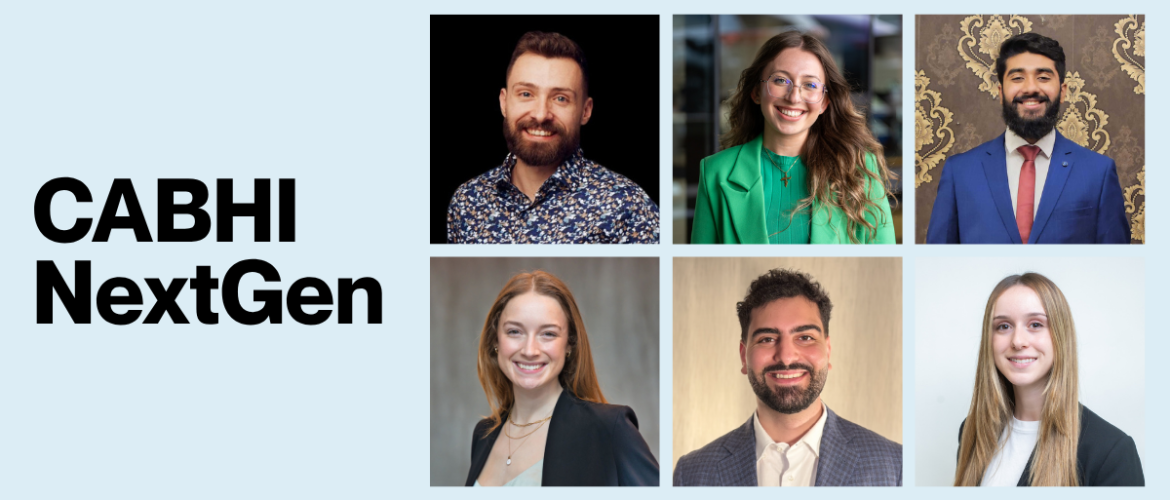Supporting Students with Bold Ideas
Groundbreaking AgeTech solutions require dedicated, specialized support to advance, much like the innovators creating them. However, in Canada, there are only a handful of programs that focus specifically on student innovators from colleges and universities who are developing aging and brain health solutions.
Here at the Centre for Aging + Brain Health Innovation (CABHI), powered by Baycrest, one of our strategic objectives is to accelerate innovation to impact by providing funding, tailored mentoring, training, and networking supports across the entire innovation pipeline. Upon realizing the service gap for student innovators, we capitalized on the opportunity to fill it with CABHI’s NextGen Support Package (NextGen).
NextGen accelerates the development of post-secondary student-led ventures that support older persons. The package consists of a bundle of resources and services to advance the growth and scale of innovative solutions, including: $2,500 (CAD), one-on-one mentorship opportunities, a custom AgeTech market curriculum, national networking, and a user-feedback session through CABHI’s Leap platform.
The Next Generation of Innovators
We welcomed six talented student innovators from across the country—Frederick Drouin, Lauren Mackay, Kendrea Sicotte, Deena Al-Sammak, Ammar Obaid, Yusuf Hassan—to participate in our inaugural NextGen cohort.
Frédérick Drouin from École de technologie supérieure is the COO and co-founder of Displaid. Displaid’s flagship innovation is a non-invasive wearable chest belt that tracks key biometrics to improve the monitoring and management of heart and kidney failure in older persons.
Lauren MacKay from Dalhousie University is the founder of Head First, a digital platform designed to support concussion recovery by streamlining communication between patients and healthcare providers and helping develop personalized recovery plans.
Kendrea Sicotte from the University of Alberta is the founder of LifeTech Care, a digital matching platform that helps older persons and caregivers discover personalized AgeTech solutions to support aging in place.
Deena Al-Sammak from McMaster University is the co-founder of Power of Play, a hand grip strength measurement tool that can be used in rehabilitation settings as an effective measure of cognitive and physical health for older persons.
Ammar Obaid from the University of Waterloo is creating a non-invasive wearable to monitor real-time brain health in various settings.
Yusuf Hassan from McMaster University is the founder of TheraScan, a mobile app that uses iPhone light detection and ranging (remote sensing) technology to establish detailed 3D maps of an older person’s home environment.
Project Objectives with Purpose
When embarking on the NextGen journey, each innovator defined a unique, solution-focused objective to achieve during the two-month initiative. In Lauren’s case, she set out to understand the unique needs of the aging population regarding concussion recovery and brain injury support, specifically how older persons navigate recovery and the barriers that come along with it.
As the innovators worked their way through the support package, they aimed to accomplish their objectives through completing the AgeTech curriculum, a mentorship session, and a Leap-facilitated end-user feedback session. Lauren MacKay, founder of Head First shared that, “NextGen was instrumental in helping [her] better understand the specific challenges faced by the aging population in concussion recovery.”
“CABHI provided invaluable access to experts and older persons that helped validate and reshape our product. Through LEAP and mentorship, we deepened our understanding of aging-focused innovation and clarified our solution’s value,” explained Lauren. “This program has been instrumental in setting us up for a meaningful next stage of development.”
Thanks to the NextGen initiative, Lauren was able to identify gaps in current care pathways and test assumptions related to concussion and brain injury recovery directly with end-users and researchers in the space.
The Final Pitch
To celebrate the conclusions of the inaugural cohort and showcase the deep learning that took place over throughout the process, CABHI hosted a virtual pitch competition for the NextGen innovators, featuring an active virtual audience, esteemed judges, and prizes. Judging the competition was an external panel consisting of individuals who are all active in the aging and brain health sector:
- Michael Chrostowski, Director of Business Development and Partnerships at AGE-WELL
- Cindy Diogo, CEO and Co-Founder at Consoul
- Anthony Palma, Director of Partnerships and Strategic Initiatives at KITE Research Institute (UHN)
The pitches demonstrated how the innovators’ solutions support the aging population and how CABHI was able to accelerate their projects.
Taking home first place was Frederick Drouin, with Deena Al-Sammak as a close second. But the awards didn’t stop there—our audience was able to select our People’s Choice Winner: Ammar Obaid!
What’s Next for the NextGen Innovators?
The NextGen Support Package offered these early-career innovators the opportunity to learn from experts in the field, network with fellow innovators and entrepreneurs, refine their solutions, and gather actionable end-user feedback. Thanks to NextGen, our innovators are better equipped to embark on the next steps in their innovation journeys.
“CABHI has been instrumental in shaping TheraScan’s development, providing tailored mentorship, strategic guidance, and opportunities to gain real-world feedback from older persons, and clinicians,” shared Yusuf Hassan, founder of TheraScan. “The program helped us refine our pitch, validate our solution, and connect with potential partners and funders. NextGen gave us the confidence and clarity to take our venture to the next level.”
Now, Yusuf is securing funding for MVP development, forming partnerships with developers, and planning a pilot study with community-based occupational therapists.
Thanks to NextGen, our student innovators gained actionable feedback to refine their solutions, enabling them to achieve their initial objectives. Now, they are gearing up to embark on the next steps of their innovation journeys, transforming their ideas into real-world impacts.


